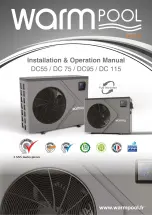
50
SS-SVX11K-EN
Refrigerant piping must be properly sized and applied.
These two factors have a very significant effect on both
system performance and reliability.
N
No
otte
e:: Use Type “L” refrigerant grade copper tubing
only.
Refrigerant Piping should be sized and laid out
according to the job plans and specifications. This
should be done when the system components are
selected.
Suction Line Piping
Proper suction line sizing is required to guarantee that
oil is returned to the compressor throughout the
operating system. Furthermore, the line must be sized
so that the pressure drop does not excessively affect
capacity or efficiency. To accomplish both, it may be
necessary to have two sizes, one for horizontal run and
vertical drops, and another for the vertical lifts. The
preselected suction line sizes shown in the table below
are independent of line length for a properly charged
RAUJ unit operating in a normal air conditioning
application.
Table 15.
Suction line interconnecting tubing
Capacity
OD unit
connection
(Per circuit)
Recommended field piping
OD
Horizontal
(Per Circuit)
OD Vertical
(Per
Circuit)
20 Ton
1-5/8"
1-5/8"
1-5/8"
25 Ton
1-5/8"
2-1/8"
1-5/8"
30 Ton
1-5/8"
2-1/8"
2-1/8"
40 Ton
1-5/8"
1-5/8"
1-5/8"
50 Ton
1-5/8"
2-1/8"
1-5/8"
60 Ton
1-5/8"
2-1/8"
2-1/8"
80 Ton
2-5/8"
2-1/8"
2-1/8"
100 Ton
2-5/8"
2-5/8"
2-1/8"
120 Ton
2-5/8"
2-5/8"
2-1/8"
Note:
If risers exceed 50 feet, the application must be reviewed by
Trane.
For more information, refer to the latest edition of
Application Guide SS-APG012-EN.
•
Do not use suction line traps.
•
Do not use double risers.
•
Avoid putting liquid lines underground.
•
Route suction lines as short and direct as possible.
•
Slope suction lines toward the evaporator ¼-inch to
1-inch for every 10 feet.
•
Insulate the suction lines.
•
The suction line filter should be as close to the
compressor as possible.
N
No
otte
e:: If Suction Riser Exceeds 50 Feet, Trane Must
Review The Application.
Liquid Line Piping
Oversized liquid lines reduce compressor reliability due
to excess refrigerant in the system, and system
operation becomes more charge critical due to liquid
thermal expansion into the condenser at higher
ambients. Conversely, liquid line OD needs to be big
enough to allow for adequate subcooling entering the
expansion valve at high load conditions. The
preselected line sizes shown in the table below are
independent of line length or rise within the limitations
of the latest edition of the Application Guide SS-
APG012-EN.
Table 16.
Liquid line interconnecting tubing
Capaci-
ty
OD unit
connec-
tion (Per
Circuit)
Recommended field piping
OD Horizontal
(Per Circuit)
OD Vertical
(Per Circuit)
20 Ton
7/8"
5/8"
5/8"
25 Ton
7/8"
7/8"
7/8"
30 Ton
7/8"
7/8"
7/8"
40 Ton
7/8"
5/8"
5/8"
50 Ton
7/8"
7/8"
7/8"
60 Ton
7/8"
7/8"
7/8"
80 Ton
1-1/8"
1-1/8"
1-1/8"
100 Ton
1-1/8"
1-1/8"
1-1/8"
120 Ton
1-1/8"
1-1/8"
1-1/8"
Note:
If risers exceed 10 feet, refer to Tube Size and Component
Selection, publication SS-APG012-EN.
The liquid line should have a slight slope in the
direction of flow so that it can be routed with the
suction line.
















































